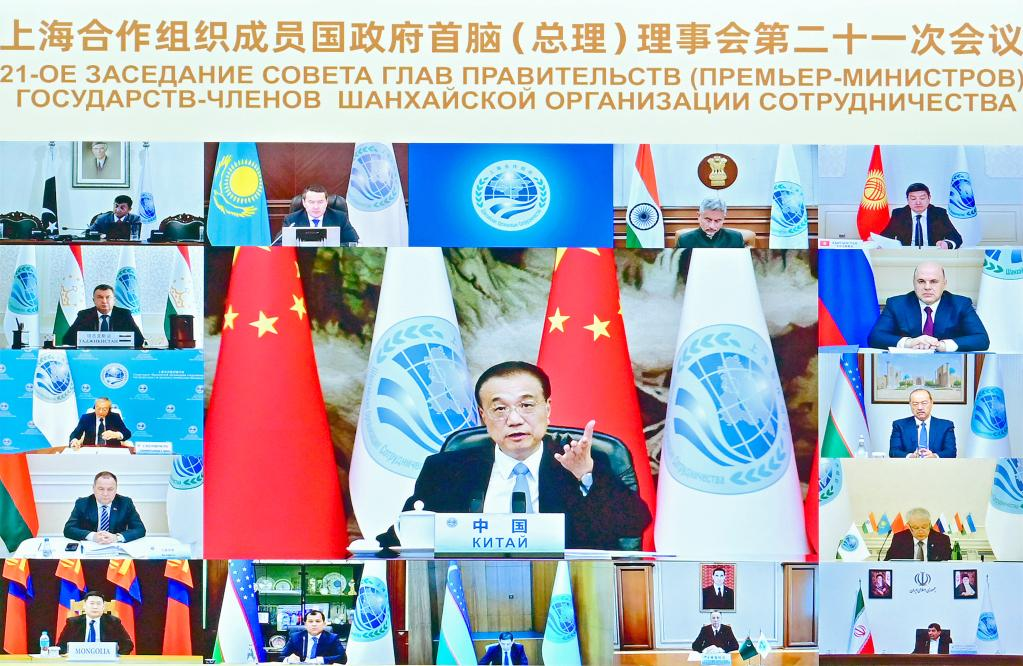
Chinese Premier Li Keqiang hosts the 21st Meeting of the Council of Heads of Government of Member States of the Shanghai Cooperation Organization (SCO) via video link at the Great Hall of the People in Beijing, capital of China, Nov. 1, 2022. (Xinhua/Yan Yan)
BEIJING, Nov. 1 (Xinhua) -- Chinese Premier Li Keqiang on Tuesday chaired the 21st meeting of the Council of Heads of Government of Member States of the Shanghai Cooperation Organization (SCO) in Beijing and put forward a five-point proposal on promoting SCO cooperation.
Kazakh Prime Minister Alikhan Smailov, Kyrgyz Prime Minister Akylbek Japarov, Russian Prime Minister Mikhail Mishustin, Tajik Prime Minister Kokhir Rasulzoda, Uzbek Prime Minister Abdulla Aripov, foreign ministers of India and Pakistan and representatives from SCO observer states attended the meeting, which was held via video link.
Li said that the SCO has made important contributions to peace and stability in the region and to the development and prosperity of regional countries. He added that at the meeting of the Council of Heads of State held in Samarkand last September, the parties reached new common understandings on the development of the SCO.
Upholding peace and pursuing development remain the trend of our times and the people's aspirations. China will continue to work with members of the SCO family to deepen political trust, win-win cooperation and friendly exchanges, champion the Shanghai Spirit, and jointly deliver greater benefits to the peoples of all countries, Li said.
He then made five proposals on advancing SCO cooperation:
First, safeguarding security and stability to foster a sound environment for development. China is ready to deepen law enforcement and security cooperation with all parties to provide safeguards for the economic and social development of all countries, Li said.
Second, expanding trade and investment to bolster regional economic recovery. Li said SCO countries need to jointly uphold the WTO-centered multilateral trading regime, support the development of an open world economy, and enhance trade and investment facilitation.
Third, enhancing connectivity to realize integrated development of the region. Li pointed out that it is imperative for SCO countries to further align development strategies, raise the efficiency of clearance at ports of entry, and preserve the resilience and stability of regional industrial and supply chains.
Fourth, promoting sustainable development to build up resilience against risks. Efforts must be made to enhance the capacity of regional countries for food and energy supply and pursue a balanced and orderly transition to green and low-carbon development, Li said.
Fifth, enhancing people-to-people and cultural exchanges to strengthen the bond between peoples. SCO countries need to fully leverage the cooperation mechanisms on education, culture, science, technology and press, and ensure the success of activities under the SCO Year of Tourism next year, Li added.
In briefing participants on China's economic situation, Li said that confronted with complex and intricate factors at home and abroad, the Chinese economy once came under downward pressures beyond expectation, with a notable decline early in the second quarter.
"China responded swiftly and resolutely, and introduced a policy package for stabilizing the economy and follow-up measures," said Li, adding that China focused on helping market entities stay afloat and keeping employment and prices stable. China relied on deepening reform to better unlock market vitality and social creativity.
Li said through these efforts, the Chinese economy reversed the downward trend in time.
"We will vigorously promote steady, sound and sustainable economic development," he added.
Li said China has more than 160 million market entities, and its people are hardworking and intelligent. This is where the greatest resilience and confidence lie in China's economic development.
China will continue to work for the full delivery of the policy package introduced for stabilizing the economy, work to maximize its effects, keep major economic indicators within the appropriate range, and strive for better results, Li said.
Li said China will stay committed to the fundamental national policy of reform and opening-up and the win-win strategy of opening-up.
China will continue on the path of peaceful development, take an active part in the reform and development of the global governance system, and work with all parties to advance world peace, stability, development and prosperity, he said.
Participants of the meeting spoke positively about the important outcomes of SCO cooperation in various fields and noted the SCO's stature as an effective platform for international cooperation and its increasingly important role in maintaining mutual trust between member states, boosting development and promoting regional peace and security.
They expressed the willingness to further tap into the cooperation potential, strengthen the mechanisms for cooperation, enhance cooperation in such areas as economy and trade, investment, innovation, environmental protection, agriculture, people-to-people and cultural exchanges, connectivity and digital economy, uphold multilateralism, and jointly tackle the challenges of food and energy security and climate change, to improve the well-being of all peoples and promote regional and global stability and prosperity.
The meeting released a joint communique and adopted a number of cooperation documents and resolutions in economy and trade, digital economy and other fields.

Chinese Premier Li Keqiang hosts the 21st Meeting of the Council of Heads of Government of Member States of the Shanghai Cooperation Organization (SCO) via video link at the Great Hall of the People in Beijing, capital of China, Nov. 1, 2022. (Xinhua/Yue Yuewei)




 A single purchase
A single purchase









